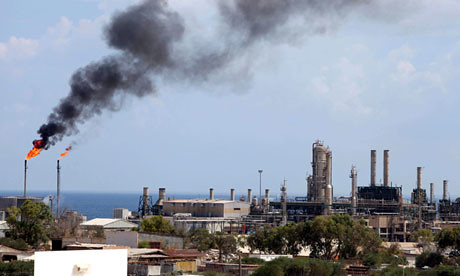
Zawiya Oil refinery in occupied Libya. Since the counter-revolution against Gaddafi and the Jamahiriya the country's oil production has declined by two-thirds., a photo by Pan-African News Wire File Photos on Flickr.
Eastern Libya Forms Regional Oil Company
TRIPOLI, Libya November 10, 2013
By ESAM MOHAMED Associated Press
The leaders of a movement for self-rule in oil-rich in eastern Libya said they have formed a regional company to handle its sales of crude oil, one of the most serious challenges yet to the central government and its revenue lifeline.
The announcement late Sunday closely followed a statement from the country's prime minister that the government could be unable to cover its expenditures because of the disruption of around 60 percent of Libya's oil exports, mostly from the eastern region.
"Because of the disruption of oil, the government may be facing a deficit," the Prime Minister Ali Zeidan told reporters. "Now, 60 percent of the oil production is halted. We may find ourselves next month or the following month in a problem."
The self-rule movement set up a shadow government last month, complaining of what it called the neglect and corruption of central authorities. Along with local tribes demanding better pay and more political rights, it has effectively halted exports from the region's main oil terminals since summer, blocking a critical government revenue source.
Abd-Rabbo al-Barassi, the head of the newly declared shadow government, said Sunday the regional oil company would be temporarily based in Tobruk, before moving to Benghazi.
Advocates of the self-rule in the east, which long has complained of discrimination by the government in the capital Tripoli, have been pushing to revive the system established under King Idris in late 1951. Libya then was divided into three states, with Cyrenaica — or Barqa, as it was called in Arabic — encompassing the eastern half of the country.
The movement had denied it was advocating self-rule to seize the country's main oil resources, and insisted it would return to a more equitable resource distribution arrangement.
Ibrahim Jedran, the top leader of the so-called Barqa government, said the company founded Sunday will sell the region's crude oil and give shares to Tripoli and other Libyan regions. He also accused the central government of corruption and said the East would manage the sales better.
"They sold the oil arbitrarily ... We will not make the same mistake," he said late Sunday, in the eastern town of Ajdabiya, 480 miles (800 kilometers) southeast of Tripoli.
Besides seizing control of five main fields and terminals in the eastern region, locals in eastern Libya last week prevented an Italian tanker from offloading at the eastern port of Hariga in Tobruk.
Zidan said Sunday that the groups must stop their blockade of the terminals by Nov. 20. "We gave these groups between a week and 10 days after which the government will carry out its duties. We will not announce them. It will be known once we implement them."
Officials in the central government had threatened to use military action against any illegal or unauthorized shipment of oil.
Zidan urged citizens to protest the continued blockade of the oil fields "to avoid bloodshed and the destruction of oil infrastructure" that could result if troops are sent in.
"The extent of the crime committed by these people must be realized," he said, adding that the continued halt of revenues could impact the government's ability to pay salaries, or provide Libyans with health services.
No comments:
Post a Comment